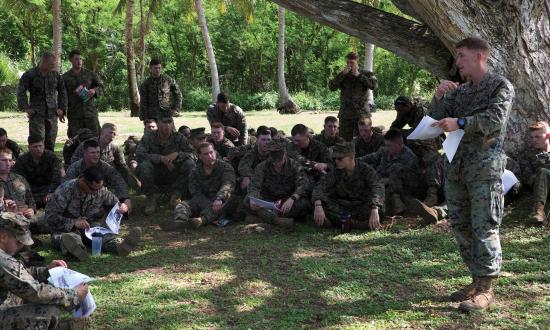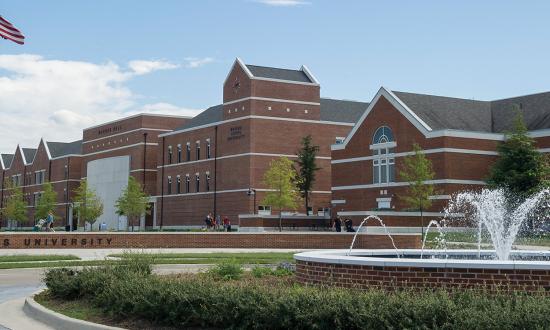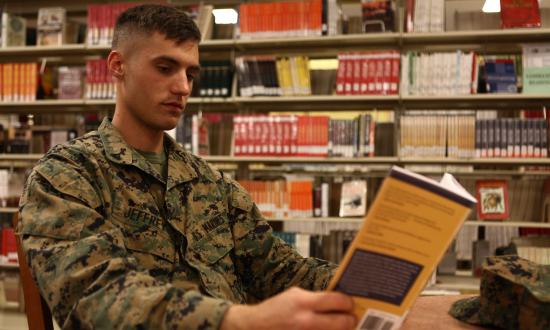Today’s security environment is fluid and laden with potential threats. Peer competitors seek to challenge the United States in all elements of diplomatic, informational, and economic power. As the nation’s force in readiness, the Marine Corps is redesigning its force structure and capabilities to compete with and deter potential adversaries. Beyond technological improvements, the Marine Corps also is in the process of developing a more mature and experienced force.
The noncommissioned officer (NCO) corps is the bedrock of this foundation. To that end, the Corporals Course curriculum must be improved by using staff noncommissioned officers (SNCOs) and commissioned officers as platform instructors, integrating additional ethical decision-making classes, and providing classified briefs on friendly and enemy planning considerations to effectively mold the next generation of leaders.
History of Corporals Course
The first Marine Corps School was founded by Major General John A. Lejeune on 1 August 1920, but the genesis of enlisted education began in the 1980s, when Commandant General Alfred M. Gray Jr. tasked Marine Corps Combat Development Command to develop a mandatory comprehensive professional military education (PME) program for noncommissioned officers (NCO).1 The PME program, entitled the “NCO Basic Course,” commenced on 1 April 1989. The course was meant to engrain in Marines a lifelong study of the profession and a foundational understanding of the Marine air ground task force. The course included professional reading, self-study, lectures, and correspondence instruction.
In 1989, the first enlisted-specific education program was established. The Noncommissioned Officers Professional Military Education Program aimed to provide NCOs the tools needed to have a larger impact within the force. General Gray’s vision brought the Marine Corps University and the aggregation of officer and enlisted education under a single headquarters. However, inconsistencies were noted with how NCOs and SNCOs were instructed across the satellite academies. Focus shifted in the 1990s to smaller think-tank like focus projects and seminar-based discussions. Eventually, corporals and sergeants were separated and educated in different courses, creating the initial foundation of Corporals Course.
In June 2009, the Marine Corps University developed the first pilot course for the first command-sponsored Corporals Course to be delivered at the battalion and squadron levels. Members within the unit would be certified by the local SNCO academies on proper instruction methods to create their own courses. The nonresident online version of Corporals Course was introduced in October 2012, and the requirement to attend the resident course became a promotion requirement to the rank of sergeant.
The curriculum for Corporals Course went through several iterations but has been left untouched for the past eight years. The topics presented encompass career progression, Marine Corps traditions, leadership, warfighting, professional communication, and basic administration. Most commands that host the course modify the base curriculum to fit the individual unit’s mission and enlist guest instructors to teach specialized topics. These variations allow a customized approach to problems the unit commander is attempting to overcome; however, it may not effectively prepare the NCOs for the challenges they may face in their own careers.
SNCO and Officer Instructors
Since 2012, Training and Education Command (TECom) has advanced the Marine Corps’ instructor cadre through the Instructor Professionalization (IP) initiative. Over the ensuing decade, the IP initiative laid out the performance standards that qualify Marines for instructor billets. This culminated in MARADMIN 5/23, which amalgamated the importance of service-wide professional instructors into Talent Management 2030 and awarded qualified Marines the 095X Exception Military Occupational Specialties.
The enthusiasm for skilled instructors has trickled down to the battalion-level command sponsored Corporals Course at 1st Transportation Battalion, 1st Marines. Although TECom requires the minimum qualification of noncommissioned officer to administer PME, 1st Transportation Battalion set a much higher standard of qualifications to be a platform instructor (a subject-matter-expert instructor assigned to teach corresponding subject classes) for its Corporals Courses. First, the instructor must be at least a SNCO. Second, the instructor must possess substantive expertise or experience in the subject matter. Last, instructors are required to either have an associate’s degree or be pursuing a bachelor’s degree.
The first two requirements resulted in corporals learning from more knowledgeable authority figures and allowed the SNCOs and officers interacting with corporals to identify latent talent in an academic setting. Sergeant Jessica Lopez, an instructor for two iterations of Corporals Course at 1st Transportation Battalion in February and April 2023, reflected on this approach during an interview:
At first, the sergeants resisted having SNCOs and officers teach because we believed . . . and still believe . . . it is our duty as sergeants to mentor and train the corporals. But then the battalion commander gave us a classified brief about current events, the battalion sergeant major gave the ethics class with over 20 years of experience in difficult dilemmas, and the [operations officer] himself taught the Marine Corps Planning Process [MCPP]. We realized the course became enriched, deep, and meaningful in a way that only comes with experience in that area. If only sergeants taught it, it would most likely be just wavetops unless we had specific experience in it.2
Third, requiring college experience from instructors replicates the standards of higher education. Noteworthy here is James Cohn, Dean of Academics at the College of Enlisted Military Education and Marine Corps Senior Enlisted Academy. Mr. Cohn’s endeavors, supported by a dedicated team, underscore the overarching aspiration to ensure Marines receive substantive college credit for their participation in enlisted PME.3
Although the Marine Corps University’s (MCU’s) Enlisted College is not accredited by the American Council on Education for degree programs, MCU has partnerships with accredited colleges that formalize the credits toward a degree. With this framework in mind, 1st Transportation Battalion built on the baseline Corporals Course curriculum, enhancing the rigor of learning, and emulating the tenets of collegiate education. Consider the instruction provided by Major Gloria Luedtke at the culmination of each course. Her discourse on “education” resonated with the corporals, with more than 80 percent expressing interest in furthering their academic pursuits based on their experiences at Corporals Course.
The transformation became evident following the third iteration of the battalion’s Corporals Course, wherein SNCOs and officers assumed instructional responsibilities. This instructional privilege, once seen as a chore, is now an opportunity to develop interest in MCPP, warfighting, and military history in eager NCOs. Even competitive lance corporals have applied and been accepted to attend the battalion’s Corporals Course. In addition, the instructors’ rapport with the company commanders and first sergeants helped identify and cultivate nascent talents, which assisted in realigning team and squad leader billet holders within the battalion. This model helped the corporals (and competitive lance corporals) pursue academic excellence and is replicable across diverse Marine Corps units beyond the 1st Transportation Battalion.
Enhancing Ethical Decision Making
General Charles Krulak first coined the term “strategic corporal” in his January 1999 article in the Marine Corps Gazette. The concept argued that decisions by noncommissioned officers at the tactical level could have strategic effects. Many factors lead to war crimes and atrocities like the incidents in Haditha in 2005 and Yusufiyah in 2006, but none of those things were done by service members who believed they were unethical. The 1st Transportation Battalion incorporated additional ethical case studies to prepare the next generation of leaders with this in mind.
Based on the curriculum The Basic School uses to train new officers, the 1st Transportation Battalion injected guided discussions about the Milgram and Stanford Prison experiments. Students watch documentaries discussing these experiments and the battalion commander or sergeant major lead a discussion about the key lessons. Students leave these classes with a deeper understanding of how easy it is to make unethical decisions based on the environment in which they are operating. Using ethical case studies helps prepare these new leaders for the challenges they will face both in garrison and when deployed that may have strategic impacts.
The discourse on ethics within the Corporals Course should transcend the realms of warfighting and operational strategies. As Mahzarin R. Banaji and Anthony G. Greenwald write in Blindspot: Hidden Biases of Good People, good people, service members, and military leaders alike “need to consider the ways in which their current environment could prompt unethical action without the decision maker’s conscious awareness.”4 Incorporating discussions around current social dilemmas empowers Marines to grasp the broader ramifications of their actions, both within the military fraternity and the larger societal context.
Inclusion of Classified Periods of Instruction
Today’s operating environment is dynamic and challenging as U.S competitors develop immense capabilities to affect military operations. Given the expeditionary advanced base operations (EABO) requirement to operate decentralized, noncommissioned officers in all occupational specialties will be relied on to execute mission-type orders. They must be given the appropriate threat and friendly force capabilities briefs to effectively employ their Marines and enable the persistence required by the current and future threat environment.
The Marine Corps is currently setting the benchmark for redesigning its service. The Army has been looking at the Marine Corps for the lessons it has learned to reshape its own capabilities. However, enlisted PME must improve as well. Currently, 1st Transportation Battalion’s Corporals Course includes the classified briefs. These classes are often the first time most of the attendees were made aware of the challenges they could potentially face. Marine Corps University must publish and distribute the classified briefs that can empower junior leaders’ decision making. Failing to fully understand the “E” in METT-TC will lead to failure on the battlefield.
The Way Forward
The current operating environment requires drastic changes to how the Marine Corps develops its junior leaders. The service cannot assume that Marines will develop themselves. The Corporals Course curriculum must be improved by using staff noncommissioned officers and commissioned officers as platform instructors, integrating additional ethical decision-making classes, and providing classified briefs on friendly and enemy planning considerations to effectively mold the next generation of Marine Corps leaders. Only through improving the knowledge of the next generation of leaders will the service be prepared to deter the nation’s competitors and aid the joint force in a potential crisis.
1. Gen Alfred M. Gray, USMC, ALMAR 255/88, November 1988.
2. Sgt Jessica Lopez, USMC, in person interview, 8 August 2023.
3. James Cohn, email interview, 3 August 2023.
4. Mahzarin R. Banaji and Anthony G. Greenwald, Blindspot: Hidden Biases of Good People (New York: Bantam, 2016).






